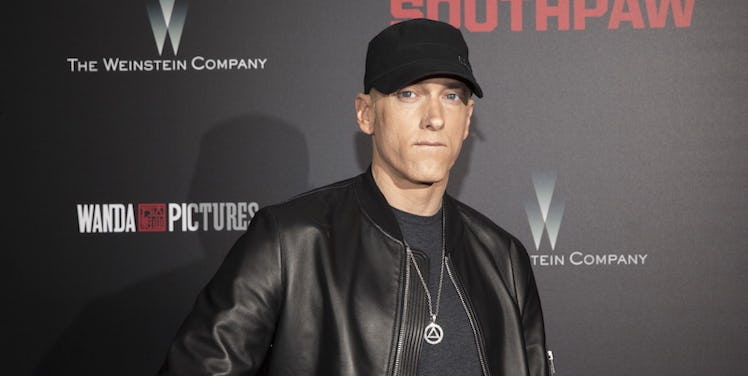
How Hip-Hop Could Actually Be The Key To Beating Mental Illness
As a musical genre, hip-hop is often denigrated for seemingly condoning misogyny, materialism, violence and crime. But this is an unfair characterization and an overgeneralization.
Yes, there are some rap artists who write songs containing nothing of substance. More often than not, however, hip-hop offers many of us an insightful view into a dark world we're unfamiliar with: the impoverished inner city.
In this sense, hip-hop has the potential to educate and foster empathy.
To borrow from Jay Z:
I think that hip-hop has done more for racial relations than most cultural icons. Save Martin Luther King, because his dream speech we realized when President Obama got elected. [Hip-hop] music didn't only influence kids from urban areas. People listen to this music all around the world, and [they] took to this music. Once you have people partying, dancing and singing along to the same music, then conversations naturally happen after that. We all realize that we're more alike than we're separate.
Indeed, hip-hop breaches ostensibly impenetrable cultural divides, breeding solidarity among people with disparate backgrounds.
This is precisely why recent albums like Kendrick Lamar's To Pimp a Butterfly have been widely celebrated and even used by high school teachers to teach lessons about race and oppression.
Beyond enlightening people on race, poverty, the War on Drugs and the inner city, it also appears hip-hop has a hidden benefit as a powerful tool against mental illness.
A study from Cambridge University found that hip-hop is extremely effective in combatting depression, bipolar disorder and addiction.
When you think about the themes hip-hop encompasses, this makes a lot of sense. Many artists rap about overcoming numerous obstacles in the ghetto, from gang violence and poverty to drugs and police brutality.
The overall narrative of hip-hop is one of progress. Artists tell dynamic stories of advancing from deeply oppressive environments to living out their wildest dreams.
Fundamentally, the message of hip-hop is one of hope.
Thus, hip-hop has the effect of "positive visual imagery," helping people see the light when the whole world feels dark.
In other words, during bipolar episodes or periods of depression, listening to hip-hop can help people visualize or imagine a more positive place and where they'd like to be in the future. In turn, they arrive at a more secure mental state.
The study was conducted by neuroscientist Dr. Becky Inkster and psychiatrist Dr. Akeem Sule.
As Dr. Sule puts it:
Much of hip-hop comes from areas of great socioeconomic deprivation, so it's inevitable that its lyrics will reflect the issues faced by people brought up in these areas, including poverty, marginalization, crime and drugs. We can see in the lyrics many of the key risk factors for mental illness, from which it can be difficult to escape. Hip-hop artists use their skills and talents not only to describe the world they see, but also as a means of breaking free. We believe that hip-hop, with its rich, visual narrative style, can be used to make therapies that are more effective for specific populations and can help patients with depression to create more positive images of themselves, their situations and their future.
One of the prime examples utilized in the study is that of the Notorious B.I.G.'s "Juicy," a hip-hop classic.
In the song, Biggie details his rise from deprivation on the harsh streets of Brooklyn to the covers of magazines and a life of affluence. It's a song about making it against impossible odds.
There are so many other examples like this within the world of hip-hop. From Jay Z's "On To The Next One" to the more recent Kendrick Lamar track, "i."
Interestingly enough, not long ago, Lamar stated he penned the song as a form of encouragement and inspiration for prison inmates and suicidal teenagers:
I wrote a record for the homies that's in the penitentiary right now, and I also wrote a record for these kids that come up to my shows with these slashes on they wrists, saying they don't want to live no more.
Accordingly, it's apparent some hip-hop artists are already deliberately attempting to help people with mental illness.
Regardless of the criticism it receives, hip-hop is a form of artistic expression with limitless educative and therapeutic potential.
The rapper Killer Mike has noted there is a commonly held view that hip-hop poses a threat or danger to society, but as he explains:
The kids spending hours per day writing rap songs aren't a threat to society; they are often trying to escape the threats from society.
Simply put, hip-hop is a form of salvation for so many people, and it should be celebrated, not condemned.
Citations: Jay Z Hip Hop Has Done More For Racial Relations Than Most Cultural Icons (Huffington Post), Kendrick Lamar Rapper Who Inspired a Teacher Visits a High School That Embraces His Work (NYT), Putting the rap into therapy can listening to hip hop beat depression (The Guardian), Hip hop classics picked by Cambridge University for mental health benefits (The Telegraph), Hip hop could help with depression and mental illness says Cambridge University (The Telegraph), Hip hop music can help people experiencing mental health difficulties (Cambridge University), Hip hop can help people with mental health issues (BBC), Jay Z Hip Hop Has Done More For Racial Relations Than Most Cultural Icons (Huffington Post), Kendrick Lamar Says He Wrote i For Inmates and Suicidal Teens (Spin), Kendrick Lamar Rapper Who Inspired a Teacher Visits a High School That Embraces His Work (NYT), Raps poetic Injustice Flashback (USA Today)